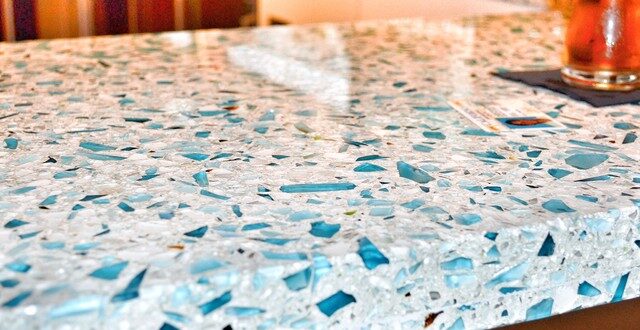Recycled Plastic Countertops: Revolutionizing Kitchen Design with Sustainability
The kitchen, often considered the heart of the home, is a space where functionality meets aesthetics. As homeowners become increasingly environmentally conscious, the demand for sustainable and eco-friendly kitchen materials has surged. Recycled plastic countertops have emerged as a compelling alternative to traditional materials like granite, quartz, and laminate, offering a blend of durability, style, and environmental responsibility.

This comprehensive guide delves into the world of recycled plastic countertops, exploring their composition, manufacturing process, benefits, drawbacks, design options, cost considerations, and maintenance requirements. Whether you’re embarking on a kitchen renovation or building a new home, understanding the nuances of recycled plastic countertops can empower you to make an informed and sustainable choice.
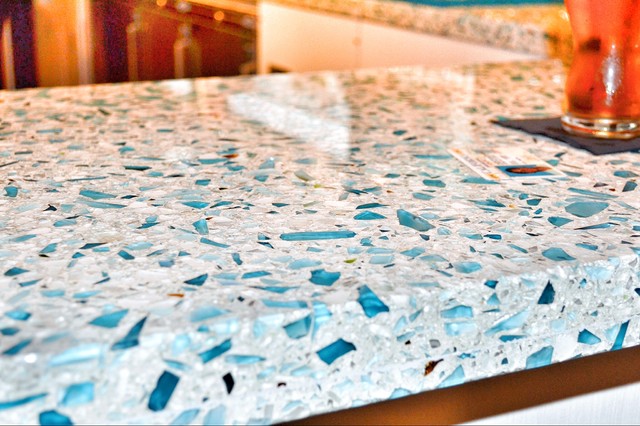
What are Recycled Plastic Countertops Made Of?
Recycled plastic countertops, as the name suggests, are crafted from post-consumer or post-industrial plastic waste. The specific composition can vary depending on the manufacturer and the intended application, but common source materials include:
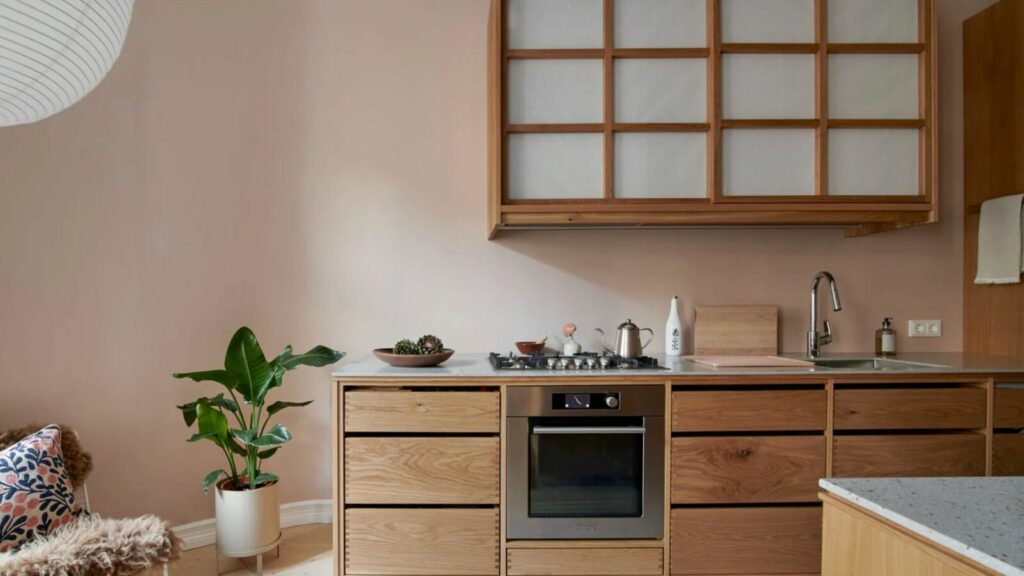
- High-Density Polyethylene (HDPE): Commonly found in milk jugs, detergent bottles, and plastic bags, HDPE is known for its strength, durability, and resistance to chemicals.
- Low-Density Polyethylene (LDPE): Used in plastic films, grocery bags, and squeeze bottles, LDPE is flexible and lightweight.
- Polypropylene (PP): Found in yogurt containers, bottle caps, and plastic furniture, PP is known for its heat resistance and durability.
- Mixed Plastics: Some manufacturers utilize a blend of various plastic types, creating a unique and often visually appealing countertop material. These blends can incorporate plastics that are more difficult to recycle individually, giving them a new lease on life.
Beyond the recycled plastic content, some manufacturers incorporate other materials to enhance the countertops’ performance and aesthetics. These may include:
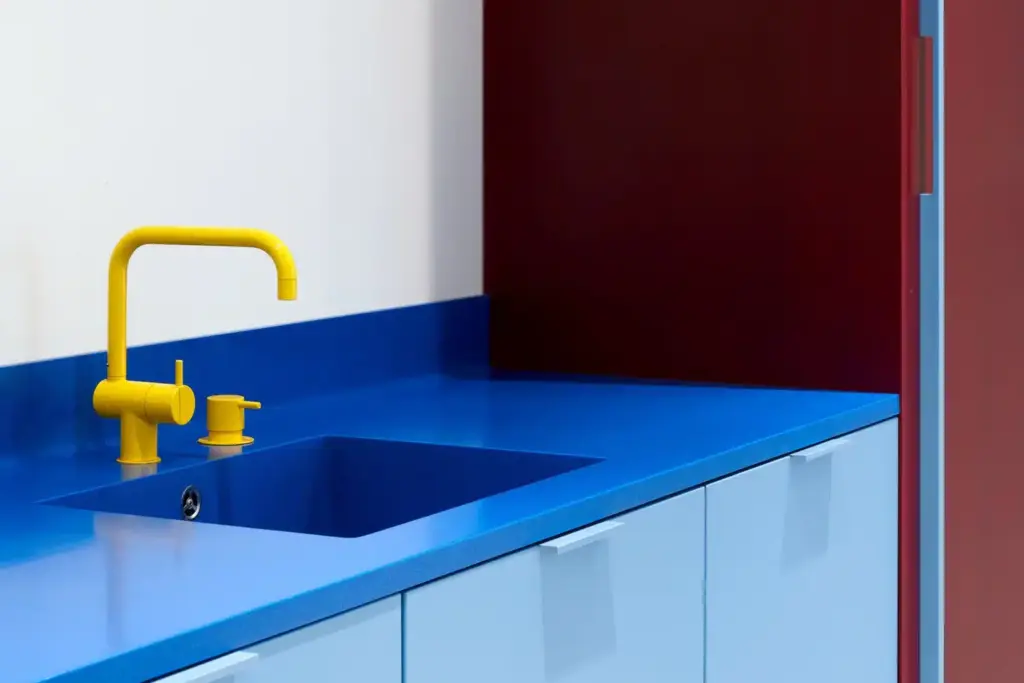
- Glass: Crushed glass can add sparkle and visual interest to the countertop surface.
- Concrete: A concrete matrix can provide structural support and create a unique texture.
- Wood Fiber: Wood fiber can be added to improve the countertop’s workability and reduce its reliance on plastic.
The Manufacturing Process: Transforming Waste into Wonder
The process of transforming discarded plastic into a beautiful and functional countertop is a testament to ingenuity and sustainable manufacturing practices. While specific techniques may vary, the general steps involved are:

- Collection and Sorting: Plastic waste is collected from recycling centers, landfills, and other sources. It is then sorted by type to ensure consistent material properties in the final product. This stage is crucial for ensuring the quality and performance of the countertops.
- Cleaning and Shredding: The sorted plastic is thoroughly cleaned to remove any contaminants. It is then shredded into small flakes or granules, making it easier to process.
- Melting and Mixing: The shredded plastic is melted and mixed with any additional materials, such as glass, concrete, or wood fiber. Color pigments can also be added at this stage to create the desired aesthetic. The precise temperatures and mixing techniques are carefully controlled to ensure a uniform and durable material.
- Molding and Shaping: The molten plastic mixture is poured into molds of various shapes and sizes. The molds are then subjected to pressure and heat to compact the material and create a solid countertop slab. Alternative methods such as compression molding or extrusion may also be employed.
- Finishing and Sealing: Once the countertop has cooled and hardened, it is removed from the mold and subjected to finishing processes, such as sanding, polishing, and sealing. These processes enhance the countertop’s appearance, improve its stain resistance, and extend its lifespan. Sealants are particularly important for preventing moisture absorption and bacterial growth.
The Benefits of Recycled Plastic Countertops: A Sustainable Solution
Recycled plastic countertops offer a multitude of advantages that make them an appealing choice for eco-conscious homeowners:
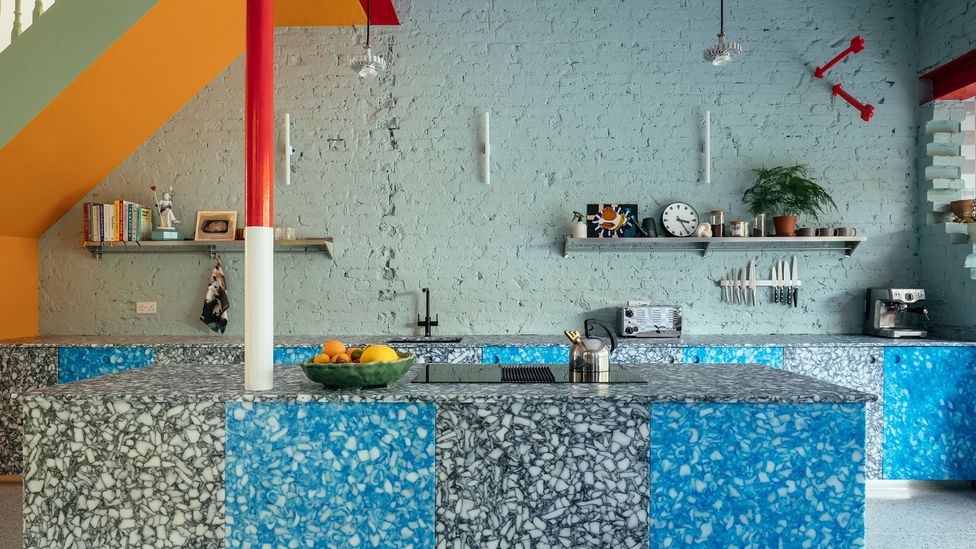
- Environmental Sustainability: By utilizing recycled plastic, these countertops divert waste from landfills and reduce the demand for virgin plastic production. This conserves valuable resources and reduces the environmental impact associated with plastic manufacturing. Choosing recycled plastic countertops is a tangible way to contribute to a circular economy and reduce your carbon footprint.
- Durability and Longevity: Recycled plastic is inherently durable and resistant to scratches, stains, and water damage. This makes these countertops ideal for high-traffic kitchens that are prone to spills and wear and tear. With proper care, a recycled plastic countertop can last for decades, providing long-term value.
- Low Maintenance: Recycled plastic countertops are non-porous, meaning they do not absorb liquids or harbor bacteria. This makes them easy to clean and sanitize with mild soap and water. Unlike granite or marble, they do not require regular sealing or polishing.
- Design Versatility: Recycled plastic countertops are available in a wide range of colors, patterns, and textures. This allows homeowners to create a custom look that complements their kitchen décor. From solid colors to speckled patterns and even simulated stone finishes, the design possibilities are virtually endless.
- Affordability: While the initial cost of recycled plastic countertops can vary, they are often more affordable than high-end materials like granite or quartz. Additionally, their durability and low maintenance requirements can save homeowners money in the long run.
- Water Resistance: Unlike wood or some natural stones, recycled plastic is naturally water-resistant. This makes it an excellent choice for kitchens and bathrooms where moisture is prevalent. You won’t have to worry about water rings or damage from spills.
- Customization: Recycled plastic countertops can be easily cut and shaped to fit any kitchen layout. This allows for seamless integration and customized designs. Manufacturers can create countertops with integrated sinks, backsplashes, and other features.
- Unique Aesthetic: The incorporation of recycled materials, such as glass or concrete, can create a truly unique and visually appealing countertop surface. These countertops can add character and personality to any kitchen.
Potential Drawbacks: Considerations Before You Commit
While recycled plastic countertops offer numerous benefits, it’s important to be aware of their potential drawbacks:
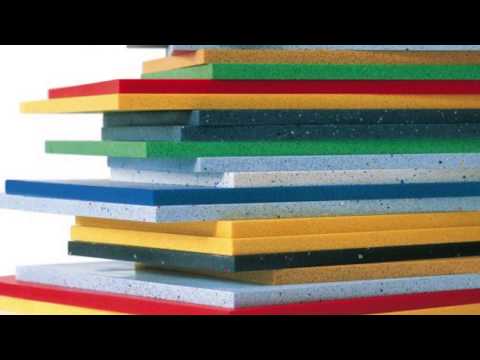
- Heat Sensitivity: Recycled plastic can be sensitive to high heat. Placing hot pots or pans directly on the countertop can cause damage. It’s always recommended to use trivets or cutting boards to protect the surface.
- Scratch Resistance: While durable, recycled plastic countertops are not completely scratch-proof. Sharp objects can leave scratches on the surface. Using cutting boards is essential to prevent damage.
- Aesthetic Limitations: While design options are plentiful, some homeowners may find the aesthetic of recycled plastic less luxurious than natural stone. However, advancements in manufacturing are constantly improving the look and feel of these countertops.
- Material Consistency: Because recycled plastic is made from varied sources, consistency in color and texture can sometimes be an issue. It’s important to work with a reputable manufacturer who implements quality control measures.
- Chemical Sensitivity: Certain harsh chemicals can damage or discolor recycled plastic countertops. Avoid using abrasive cleaners or solvents. Stick to mild soap and water for cleaning.
- UV Degradation: Prolonged exposure to direct sunlight can cause some recycled plastics to fade or degrade over time. Consider using window treatments or UV-resistant sealants to protect the countertop.
Design Options: Unleashing Your Creativity
Recycled plastic countertops offer a surprising range of design options to suit various kitchen styles:
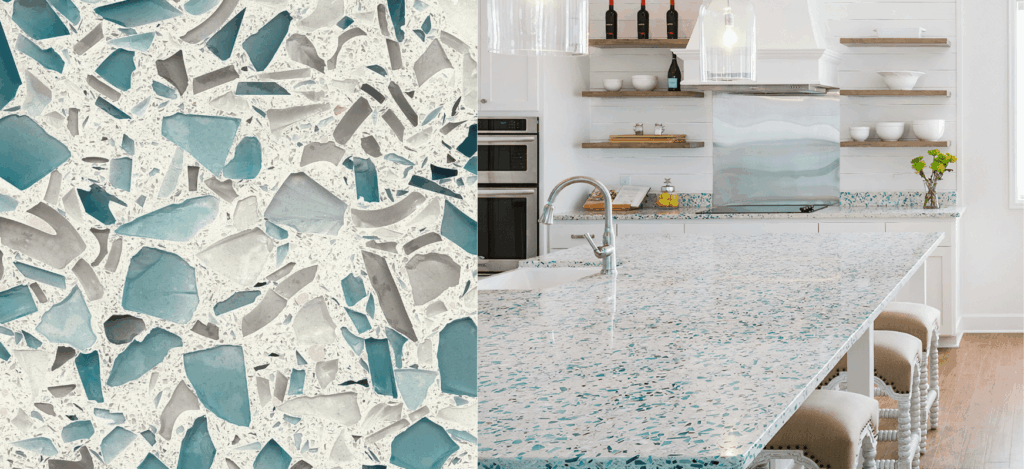
- Colors: From neutral tones to vibrant hues, recycled plastic countertops can be manufactured in virtually any color. This allows you to match your countertop to your cabinets, flooring, and other kitchen elements.
- Patterns: Speckled, swirled, and solid patterns are all possible with recycled plastic countertops. Some manufacturers even offer custom patterns that incorporate logos or other unique designs.
- Textures: Recycled plastic countertops can be smooth, textured, or even embossed. The texture can add visual interest and improve the countertop’s grip.
- Edge Profiles: A variety of edge profiles, such as bullnose, beveled, and ogee, can be applied to recycled plastic countertops. The edge profile can significantly impact the countertop’s overall look and feel.
- Inclusions: Adding glass, concrete, or other materials to the recycled plastic mixture can create unique and visually striking countertops. These inclusions can add sparkle, texture, and depth to the surface.
- Simulated Stone Finishes: Advancements in manufacturing have made it possible to create recycled plastic countertops that mimic the look of natural stone, such as granite or marble. These countertops offer the aesthetic appeal of natural stone with the sustainability and durability of recycled plastic.
Cost Considerations: Balancing Sustainability and Budget
The cost of recycled plastic countertops can vary depending on several factors, including:
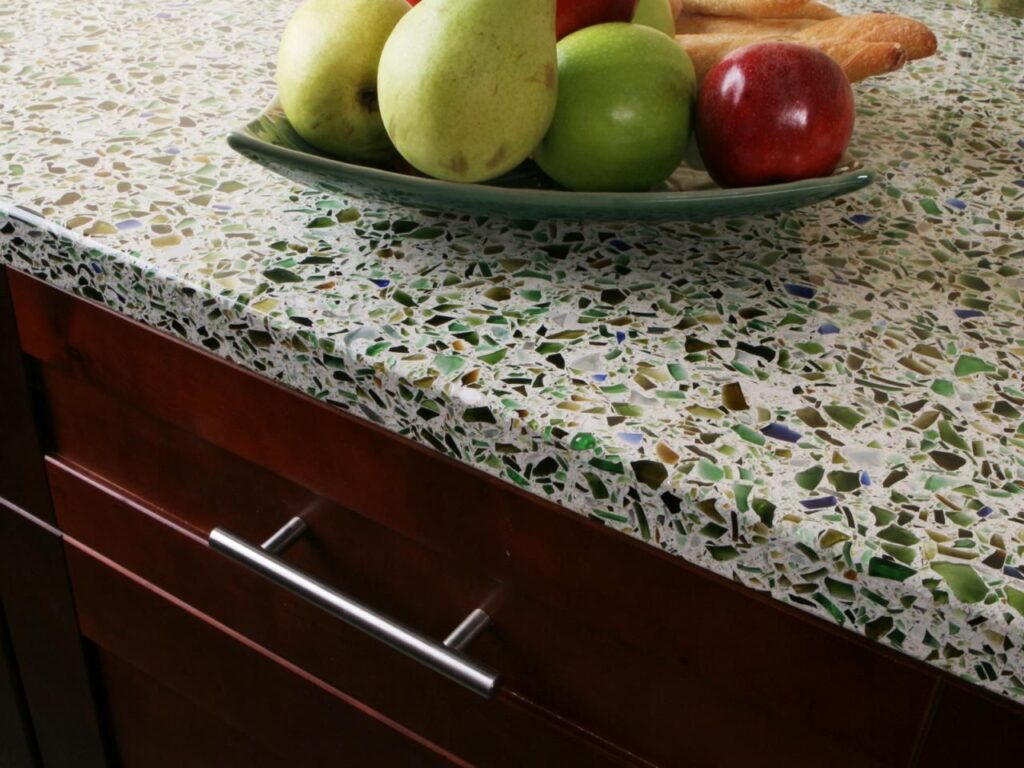
- Material Composition: Countertops made from a higher percentage of recycled plastic may be more expensive. The type of plastic used can also impact the price.
- Design Complexity: Custom colors, patterns, and edge profiles can increase the cost of the countertop.
- Size and Thickness: Larger and thicker countertops will naturally cost more.
- Manufacturer: Different manufacturers have different pricing structures.
- Installation Costs: Professional installation can add to the overall cost of the project.
- Location: Prices can vary depending on your geographic location.
Generally, recycled plastic countertops fall in the mid-range price category, making them a cost-effective option compared to high-end materials like granite or quartz. While it’s essential to compare prices from different suppliers, focusing solely on the lowest price may not be the best approach. Consider the quality of the materials, the manufacturer’s reputation, and the overall value proposition.
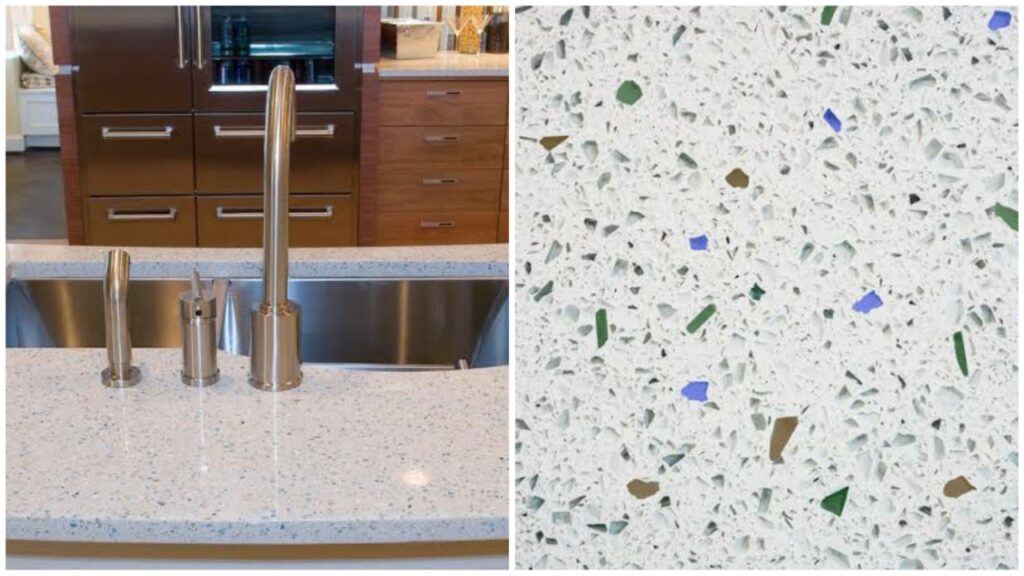
Maintenance and Care: Keeping Your Countertops Looking Their Best
Maintaining recycled plastic countertops is relatively simple and straightforward:
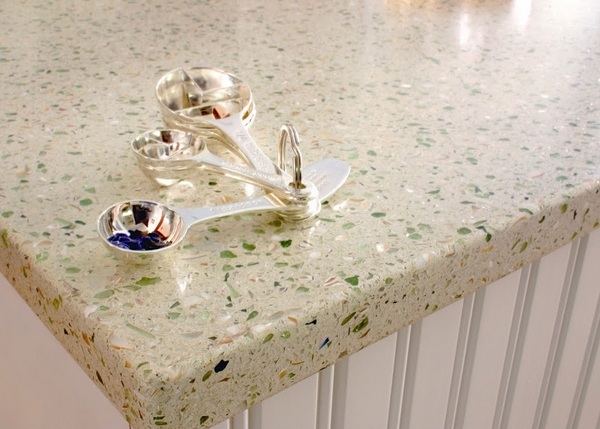
- Daily Cleaning: Wipe down the countertop with a damp cloth and mild soap after each use.
- Spill Clean-Up: Clean up spills immediately to prevent staining.
- Avoid Abrasive Cleaners: Do not use abrasive cleaners or scouring pads, as they can scratch the surface.
- Use Cutting Boards: Always use cutting boards to protect the countertop from scratches.
- Use Trivets: Place hot pots and pans on trivets to prevent heat damage.
- Avoid Harsh Chemicals: Avoid using harsh chemicals, such as bleach or ammonia, as they can discolor the surface.
- Regular Sealing (Optional): While not always necessary, applying a sealant every few years can help protect the countertop from stains and water damage.
With proper care and maintenance, your recycled plastic countertops can maintain their beauty and durability for many years to come.
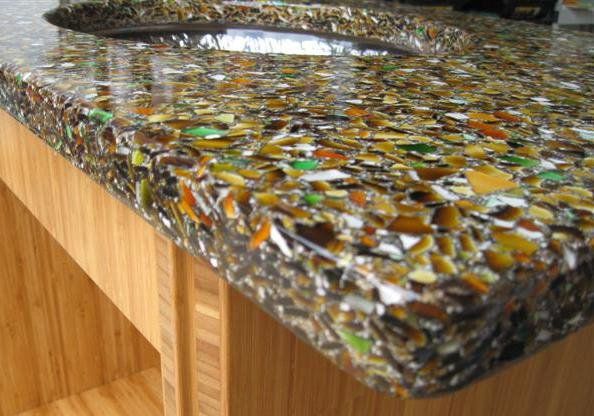
Finding the Right Recycled Plastic Countertop Manufacturer
Choosing the right manufacturer is crucial to ensuring the quality and sustainability of your recycled plastic countertops. Look for manufacturers who:
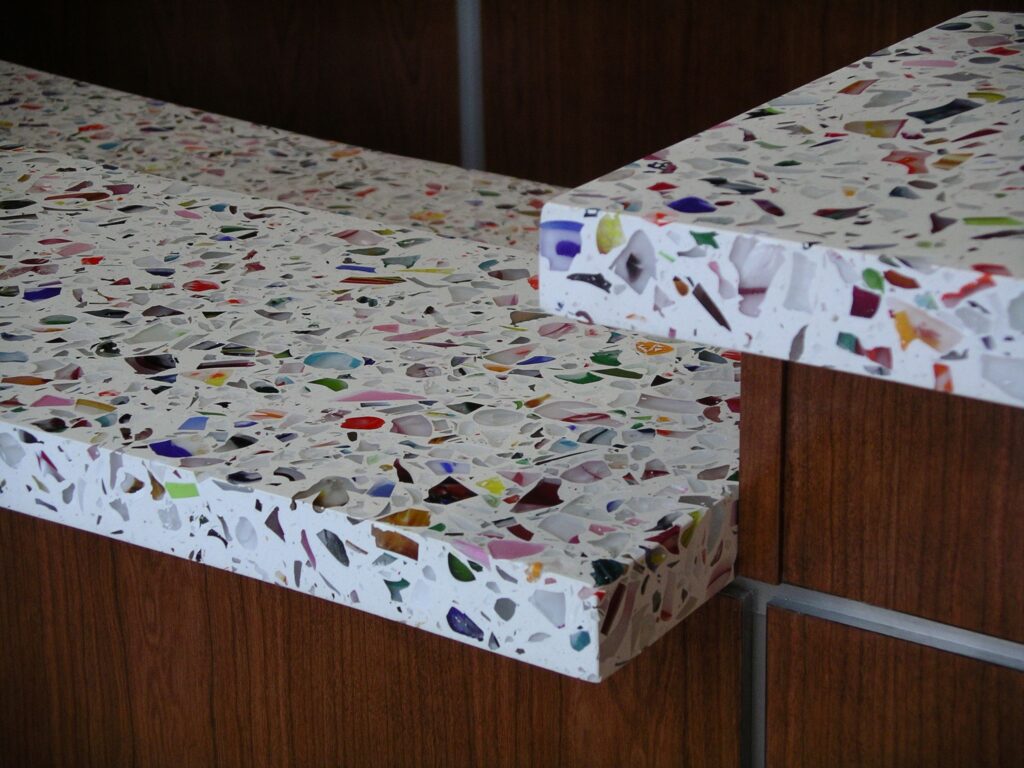
- Use a high percentage of recycled plastic: Inquire about the percentage of recycled content in the countertops. The higher the percentage, the more environmentally friendly the product.
- Have a transparent supply chain: Ask about the source of the recycled plastic and the manufacturing process. A transparent supply chain indicates a commitment to ethical and sustainable practices.
- Offer a warranty: A warranty provides assurance of the countertop’s quality and durability.
- Have positive customer reviews: Read online reviews to get a sense of the manufacturer’s reputation and customer satisfaction.
- Are certified by reputable organizations: Look for certifications from organizations like the Global Recycle Standard (GRS) or SCS Global Services, which verify the recycled content and sustainability of the product.
The Future of Recycled Plastic Countertops
Recycled plastic countertops are poised to play an increasingly significant role in the future of kitchen design. As technology advances and consumer demand for sustainable products grows, we can expect to see further innovation in this field. This includes:
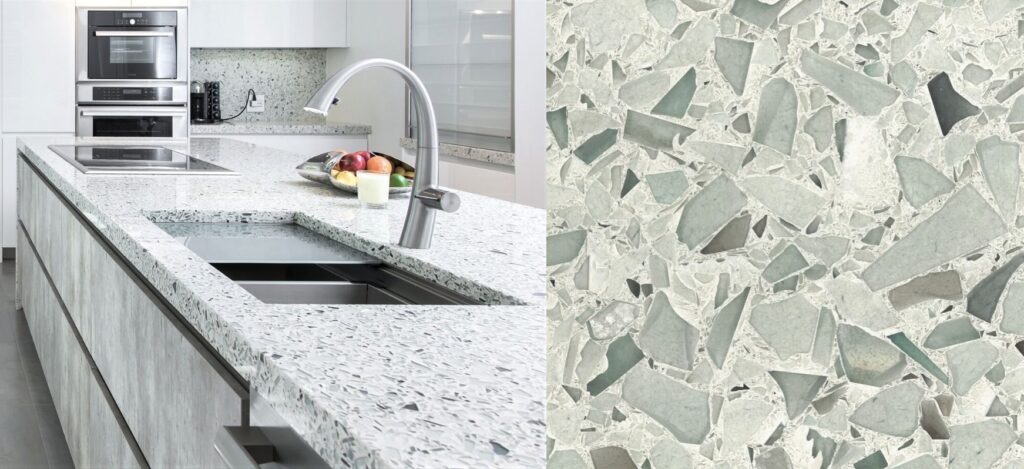
- Improved Aesthetics: Researchers and manufacturers are constantly working to improve the look and feel of recycled plastic countertops, making them even more appealing to homeowners. Expect to see more sophisticated designs, textures, and color options.
- Enhanced Durability: New technologies are being developed to further enhance the durability and heat resistance of recycled plastic countertops. This will make them an even more practical choice for high-use kitchens.
- Greater Accessibility: As production scales up and competition increases, the cost of recycled plastic countertops is likely to decrease, making them more accessible to a wider range of homeowners.
- Integration with Smart Home Technology: Imagine countertops that can monitor temperature, detect spills, and even provide cooking instructions. The integration of smart home technology into recycled plastic countertops is a distinct possibility in the future.
- Closed-Loop Systems: The ultimate goal is to create closed-loop systems where old recycled plastic countertops can be recycled back into new countertops, further reducing waste and promoting sustainability.
Conclusion: A Sustainable and Stylish Choice
Recycled plastic countertops offer a compelling combination of sustainability, durability, and style. By choosing recycled plastic countertops, you can reduce your environmental impact, create a beautiful and functional kitchen, and support a more circular economy. While it’s important to consider the potential drawbacks and choose a reputable manufacturer, the benefits of recycled plastic countertops far outweigh the risks. As the demand for sustainable products continues to grow, recycled plastic countertops are poised to become an increasingly popular choice for homeowners who want to make a positive impact on the planet.
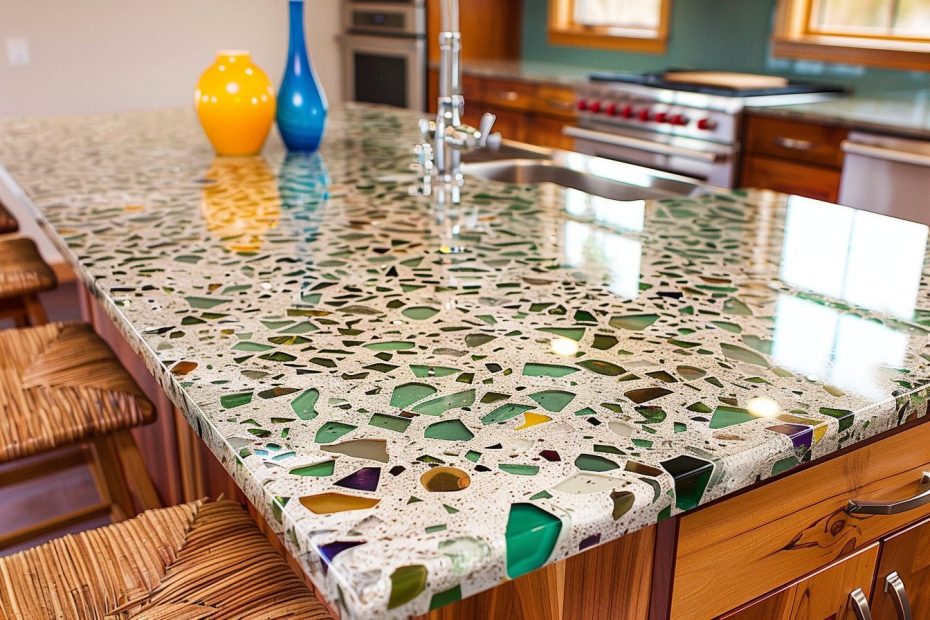
Ultimately, the decision of whether or not to install recycled plastic countertops in your kitchen is a personal one. However, by carefully considering the information presented in this guide, you can make an informed and confident choice that aligns with your values and lifestyle. Embrace the future of kitchen design with recycled plastic countertops and create a space that is both beautiful and sustainable.

 Nimila
Nimila
